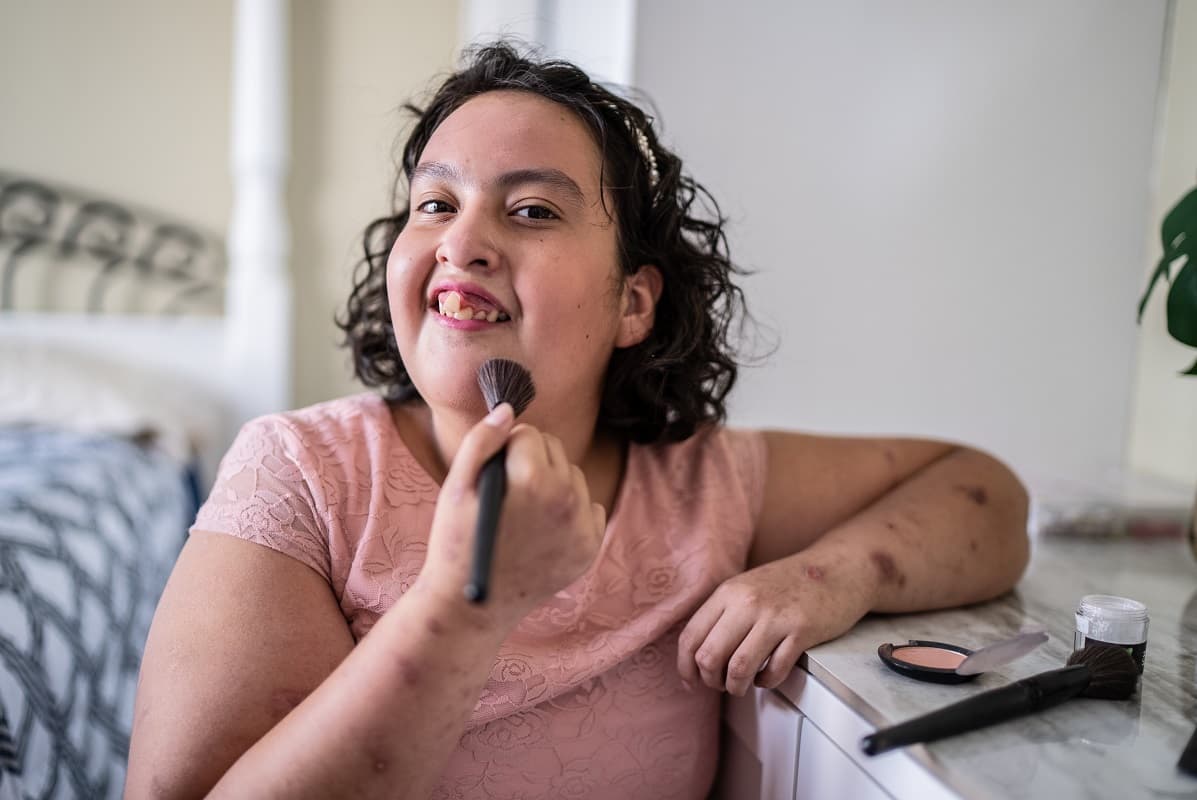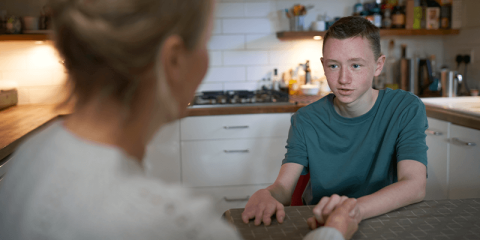Self-esteem is how we think and feel about ourselves. It’s not just how we feel about the way we look (though this is certainly part if it) it’s about how we feel about ourselves, inside and out. As children grow up and try to work out who they are and how they fit into the world, their self-esteem can be quite fragile. But you’ll be pleased to hear there are lots of things parents can do to help boost their teens’ self-esteem, and help them grow into confident, happy adults.
How parents can help
In this short video, curriculum leader Arlene Cleland explains how parents can help boost young people's self-esteem.
What is self-esteem?
Self-esteem is how we think and feel about ourselves, and how much we value and believe in ourselves. If we have high self-esteem, it means we see ourselves in a mostly positive light. We accept ourselves the way we are and are more able to stand up for ourselves and move on when we make mistakes. If we have low self-esteem, we see ourselves more negatively. This means that we can feel we aren’t good enough and don’t deserve to be happy, and can find it harder to cope when things go wrong.
What’s the difference between self-esteem, confidence and resilience?
Self-esteem, confidence and resilience are all buzzwords we hear a lot. We know they’re important – but what do they all mean?
Confidence is about the belief we have in our abilities, whereas self-esteem is how we value ourselves as a whole. So for example your child might have high self-esteem, in that they know they are worthy of being loved and happy, but may have no confidence in their ability to do maths, or to speak up in class. Or they may be very confident when it comes to passing exams or playing sport, but still feel down on themselves as a person. However, the more confident we are in what we can do, the easier it is to build our self-esteem.
Resilience is being able to adapt to different situations and difficult times. It’s more than just coping – it’s coping well, and moving forwards by building on what we’ve learnt in the past. If we have high self-esteem and feel confident in our abilities, it’s easier to be resilient – they’re all linked! You can read our tips for helping teens build resilience here.
What affects young people's self-esteem?
Young people’s self-esteem can be affected by lots of different things. Things like doing well at school or receiving compliments can make them feel better about themselves, while things like being teased or bullied, or breaking up with a girlfriend or boyfriend, can lower self-esteem. Other influences like social media can also affect how teens feel about themselves.
Why is it important to help your teen build their self-esteem?
Most of us will have times when our self-esteem takes a hit and we feel more down on ourselves. Young people in particular can be very up and down. And as long as we’re more up than down, this is okay. But having low self-esteem all the time can make it harder for teens to deal with the challenges life throws at them, and can lead to feelings of isolation and mental health problems like anxiety and depression. So the more parents can do to help young people boost their self-esteem, the better.
How is self-esteem linked to body image?
Body image is determined by how we feel about the way we look, whereas self-esteem is how we feel about ourselves, including (but not just) the way we look. So feeling bad about the way we look can affect our self-esteem.
To help your child feel more comfortable about their body, read our page on supporting your teen to have a good body image and our tips for helping your teen accept their body.
How can social media affect self-esteem?
Comparing ourselves to people living seemingly perfect lives on social media can affect our self-esteem too. Our tips for helping teens get the most out of social media has suggestions for ways they can avoid the negative influences of social media, and create a safe, inspiring online space for themselves.
Tips for helping your child build self-esteem
Tip #1: Show them how much you love them
It might sound obvious, but make sure they know how much you love them. Young people often shrug off this kind of chat, but if you keep repeating it, it’ll sink in!
Tip #2: Help them challenge negative thoughts
We all have that little voice in our heads that says mean things to us. Sometimes we can dismiss it, but sometimes it’s hard to shut it up, and it can make us feel down on ourselves.
If your child expresses negative thoughts or opinions about themselves, here are some questions that will help them challenge the harsh inner voice:
- Why do they think that? Did something happen? For example, did someone at school say something unkind to them? If so, you could discuss this together – maybe that person was having a bad day and didn’t mean it. Just because someone said it, it doesn’t make it true. Or maybe there’s no reason for them to think this negative thing about themselves at all.
- Would they say this negative thing to a friend? What would a friend say to them about it? If their friend was struggling with this issue, what would they say to them?
This video on YouTube shows a good technique for letting go of negative thoughts by picturing them floating down a river on a leaf.
Tip #3: Celebrate success and make the most of failure
It can be so easy to beat yourself up when you make a mistake, but this doesn’t help anything. So if your child makes a mistake or something doesn’t go to plan, make sure they know it’s not the end of the world. Try to help them look for the silver lining. It isn’t making mistakes that matters, it’s how we deal with them – how we try to put things right, forgive ourselves and learn from it.
And don’t forget to praise them, not just for their achievements (although this is important!) but how they cope when things don’t go the way they wanted.
Tip #4: Encourage them to look after themselves
How we feel about ourselves can be affected by lots of different things, including what we eat, how we spend our time and how much sleep we get. So encourage your teen to look after themselves – for example, to make time for hobbies they enjoy, eat a balanced diet, spend time outdoors and get plenty of sleep.
Our pages on supporting your teen’s mental health have tips for how you can help them, and you could also suggest they have a look at this page from Mind which has tips for teens.
Tip #5: Focus on the good things

Suggest they write down all the good things about themselves in a special notebook, or on slips of paper which they can keep in a box or jar. If someone says something nice about them as a person, get them to write that down too – even if they don’t believe it! You could give them a list of things you love about them to get them started.
Likewise they could also keep a list of things they’re proud of that they’ve achieved. We’re not just talking about school or sporting achievements here but all sorts of different things – for example, maybe they helped a friend or family member or tried a new activity.
You could suggest they make the list with a friend, so they can write nice things about each other.
All this will help them value themselves as a whole, and if they’re ever feeling a bit down, looking back at their lists will give them a boost.
Tip #6: Encourage them to help out
Using their skills to help friends or family or volunteering with a charity or community organisation can really give their confidence and self-esteem a boost. They can find lots of opportunities on the Volunteer Scotland website.
Tip #7: Let them voice their ideas and opinions

You may not always agree with them, but it’s important to show your child that you value their thoughts and opinions. It’s also good to show that you’re interested in the things that matter to them, so try to find time to chat to them regularly about their opinions, their hobbies or interests, what they’re doing in school or who they’re following online.
Tip #8: Help them practise being confident
One thing you can do to help your teen present themselves more confidently and be more assertive is to practise with them.
Being assertive is something many people find difficult – adults as well as young people. It means being able to stand up for yourself and say what you think or feel without being pushy or disrespectful. If your child is worried about asserting themselves, you could suggest you practise together. For example, if they’re nervous about telling their friends that they don’t want to do something, you could practise the conversation together.
They could also practise being more confident. For example, they could practise standing more confidently, introducing themselves to a new friend, or speaking up in class. After a while, acting confidently may start to come more naturally to them.
Your teen can find more tips on being assertive on the Childline website.
Tip #9: Suggest ways for them to express themselves

Whether it’s music, dance, drawing, coding, cooking, writing or acting, doing something creative can help young people express their emotions. And discovering something they’re good at will give their self-esteem a big boost. Our page on things for teens to do has lots of suggestions of things they could try.
Tip #10: Set a good example
As much as you can, try not to criticise yourself in front of them, and to face setbacks with a positive attitude. To get started, maybe you could suggest that, in the evening, everyone in the family talks about three things that have gone well that day. And when you talk about the things that didn’t go so well, try and see the up side – what did they learn? What will they do differently next time? Can they see the funny side?
Getting help and support
There are lots of online resources for teens that can help if they’re struggling with their self-esteem. They may find these articles from Mind and YoungMinds helpful – maybe you could look at them together.
Aye Feel is a great resource from Young Scot with lots of information for young people on how to look after their emotional wellbeing and mental health, discover support from organisations around Scotland and get tips on how to promote a positive mindset.
If you’re worried that your teen’s low self-esteem is stopping them from doing everyday things, like eating properly, going to school or going out with friends, you can talk to your GP about it with your teen, or without them if they won’t come. Your GP can then talk to you about the support available in your area. Our page on getting help and support when you’re raising a teen has more advice and resources.
 Activities & Play
Activities & Play Behaviour
Behaviour Childcare
Childcare Development & Growing Up
Development & Growing Up Family, Friends & Relationships
Family, Friends & Relationships Feeding Your Baby
Feeding Your Baby Food & Eating
Food & Eating Health & Safety
Health & Safety Mental Health & Wellbeing
Mental Health & Wellbeing Money & Work
Money & Work Online Behaviour & Safety
Online Behaviour & Safety Pregnancy & First Days
Pregnancy & First Days School & Education
School & Education Sleep
Sleep








 Behaviour
Behaviour
 Sleep
Sleep